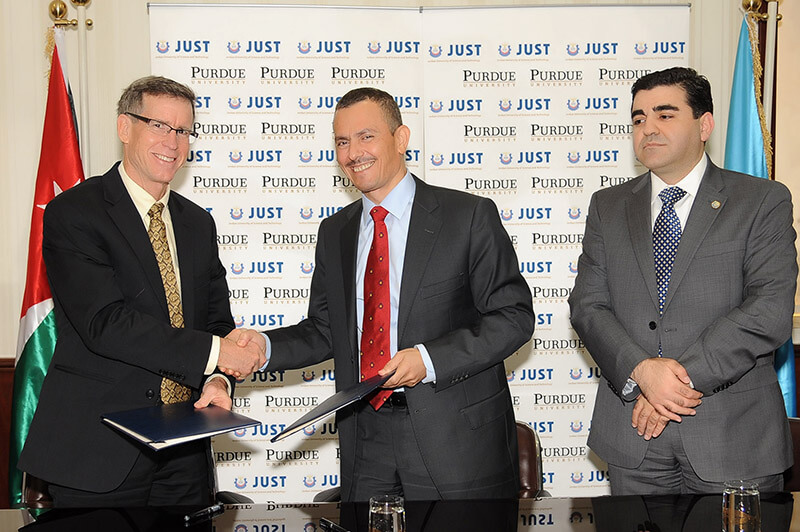October 16, 2017
Purdue, Jordan partner on center to tackle regional, global health challenges
 E. Daniel Hirleman, Purdue’s chief corporate and global partnerships officer, shakes hands with Omar Al-Jarrah, president of the Jordan University of Science and Technology, as Khalid I. El-Salem, vice president, and FAAN Professor of Neurology at JUST, watches, following the agreement.
Download image
E. Daniel Hirleman, Purdue’s chief corporate and global partnerships officer, shakes hands with Omar Al-Jarrah, president of the Jordan University of Science and Technology, as Khalid I. El-Salem, vice president, and FAAN Professor of Neurology at JUST, watches, following the agreement.
Download image
WEST LAFAYETTE, Ind. — Purdue University, the Jordan University of Science and Technology (JUST), and the Council of Higher Education of Jordan have agreed to establish the Regional Center for Infectious Diseases and Antimicrobial Resistance.
Through the center, Jordan, a partner in the Global Health Security Agenda, and other nations in the region will work together to reduce the threat of infectious diseases and antimicrobial resistance globally. The center will be part of JUST, and as a co-founding academic partner, Purdue will play a principal role in its launch and early-stage development. As educational degree programs are established, the center is expected to become an institute.
Professor Omar Al-Jarrah, the president of JUST, said the center aligned well with the university’s strategic plans, and will “bolster our pioneering role in responding to the urgent necessities for protecting human and animal health, and preserving the safety and security of food and the environment.”
E. Daniel Hirleman, Purdue’s chief corporate and global partnerships officer, said, “The unique health challenges of this region provide an opportunity for global collaboration and for demonstrating the practical impact of university innovations. We are excited to be a founding partner in this effort and to have such an impact on global health challenges.”
Hirleman and Al-Jarrah said as the institute develops it will revolutionize efforts to mitigate national, regional and global threats of infectious diseases and to provide rapid and effective responses. For the first time, the institute will put into place the mechanisms and logistics to combine national and regional multidisciplinary expertise to spearhead research and training in infectious and zoonotic diseases, disease diagnosis, and vaccine development and immunology.
In addition, the institute will facilitate rapid epidemiological surveillance, tracking, and response to emerging diseases and antibiotic resistance that increasingly has become a serious issue. Hirleman said Purdue was well-positioned to contribute to this effort, especially through the Purdue Institute of Inflammation, Immunology and Infectious Disease (PI4D), a pillar of its Life Science initiative.
Al-Jarrah said the institute will maximize the use of existing scientific expertise and equipment in areas of bacteriology, parasitology, virology, biological sciences, epidemiology, infectious diseases, statistics, immunology, medicinal chemistry, pharmaceutical sciences, medicine and public health. It also will draw from strengths in disciplines such as infectious diseases, epidemiology, computer engineering and data visualization to build capacity for electronic global, regional and national tracking of epidemic, pandemic and emerging diseases.
The institute will develop a research agenda and academic programming to increase the capacity of Middle Eastern countries to effectively respond to infectious disease threats and contribute to the accelerated efforts to promote the Global Health Security Agenda, for which a primary focus is infectious disease threat reduction. The plan calls for the development of MS/Ph.D. degree programs, certificate programs and diplomas training programs.
Hirleman said the institute will lead multidisciplinary teams and collaborate with national and regional offices of the Food and Agriculture Organization, World Organization for Animal Health, World Health Organization and Centers for Disease Control and Prevention to enhance global networking to address threats of infectious diseases.
“This coordination will be critical to improving human and animal health, and meeting the global challenges of emerging infectious and zoonotic diseases and antimicrobial resistance,” Hirleman said.
Al-Jarrah added that the institute’s establishment will help educate a new generation of professionals who will have an impact on leading growth and economic development initiatives.
“The institute will enhance both JUST’s and Purdue’s global impact, as well as strengthen the links between the founding universities with the industrial and health sectors in the Kingdom, the region, and the world,” Al-Jarrah said.
Contact: Jim Bush, 765-494-2077
Source: Dan Hirleman, 765-494-9095, dhirleman@purdue.edu

